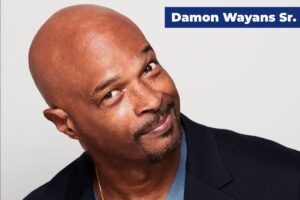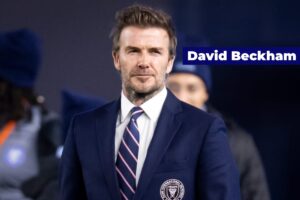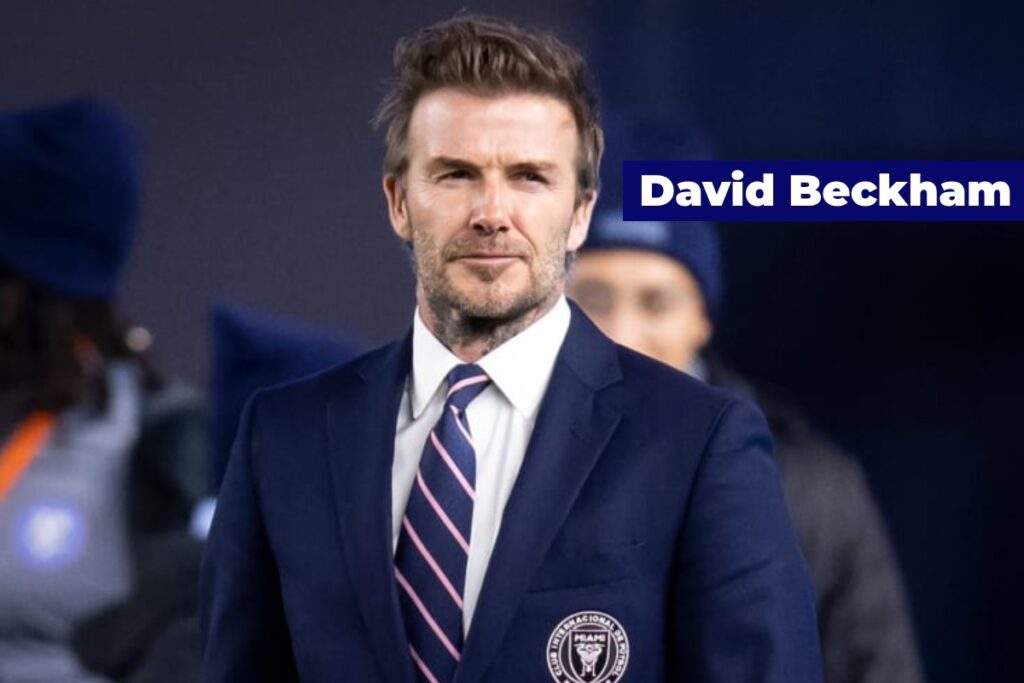
David Beckham: The Making of a Global Football Icon
Few names in football—or even in popular culture—match the weight and recognition of David Beckham.
A maestro of the midfield, a master of the free kick, and a symbol of style, David Beckham transcended football to become a global phenomenon.
He serves as a worldwide football ambassador and embodies British culture, a figure whose legacy continues to inspire and captivate.
His journey from a working-class London neighborhood to the dazzling heights of international stardom tells a story of talent, tenacity, and transformation.
With a career spanning two decades, 19 major trophies, and a personal brand that redefined celebrity, David Beckham’s life reflects both the man and the game he loved.
Early Life and Education
David Robert Joseph Beckham entered the world on May 2, 1975, at Whipps Cross University Hospital in Leytonstone, London, England.
His parents, Sandra Georgina, a hairdresser, and David Edward Alan “Ted” Beckham, a kitchen fitter, welcomed their son into a tight-knit family.
Married since 1969 in Hackney, London, they named him Robert after Bobby Charlton, Ted’s football hero.
David grew up alongside his older sister, Lynne Georgina, and younger sister, Joanne Louise.
Roots ran deep in Beckham’s family. His maternal grandfather’s maternal grandmother, Elizabeth Lazarus Llewellyn, was Jewish, a heritage David embraced.
He once called himself “half Jewish” and later wrote in his autobiography that Judaism touched him more than any other faith. Church played a big role too.
In his book Both Feet on the Ground, he recalls attending every week with his parents—not just for faith, but because it let him play football for their team.
Football pulsed through the Beckham household. His parents, die-hard Manchester United fans, often trekked 200 miles from London to Old Trafford to cheer on their team.
David caught that passion early. He loved the game more than anything else, a spark inherited straight from his mum and dad.
Growth came slow for young David. His small size kept him off the England Schoolboys’ team, marking him as a late bloomer. But talent simmered beneath.
He joined one of Bobby Charlton’s Soccer Schools in Manchester, where his skills earned him a spot in a training session with Barcelona—a prize from a talent contest.
Those early days shaped him, blending family love, football dreams, and a quiet determination that would one day carry him far beyond Leytonstone.
Beckham’s story began here, rooted in loyalty and a boy’s unbreakable bond with the ball.
David Beckham’s Club Career
David Beckham’s name conjures images of curling free kicks, perfectly weighted passes, and a flair that turned football pitches into stages.
His club career, spanning over two decades, is a testament to his talent, resilience, and ambition—a journey that took him from the youth fields of Manchester to the glitz of Los Angeles and the elegance of Paris.
With 19 major trophies and stints at some of the world’s most iconic clubs, David Beckham didn’t just play football; he redefined it.
This is the story of his club career, a saga of triumphs, trials, and a legacy that echoes beyond the game.
David Beckham’s Youth Career
David Beckham’s journey to becoming one of football’s most iconic figures began in his youth, where he honed his skills across several clubs before breaking into the professional scene.
His early career showcased the determination and talent that would later define his legacy.
Beckham’s footballing roots trace back to Ridgeway Rovers, a local youth team in Chingford, East London.
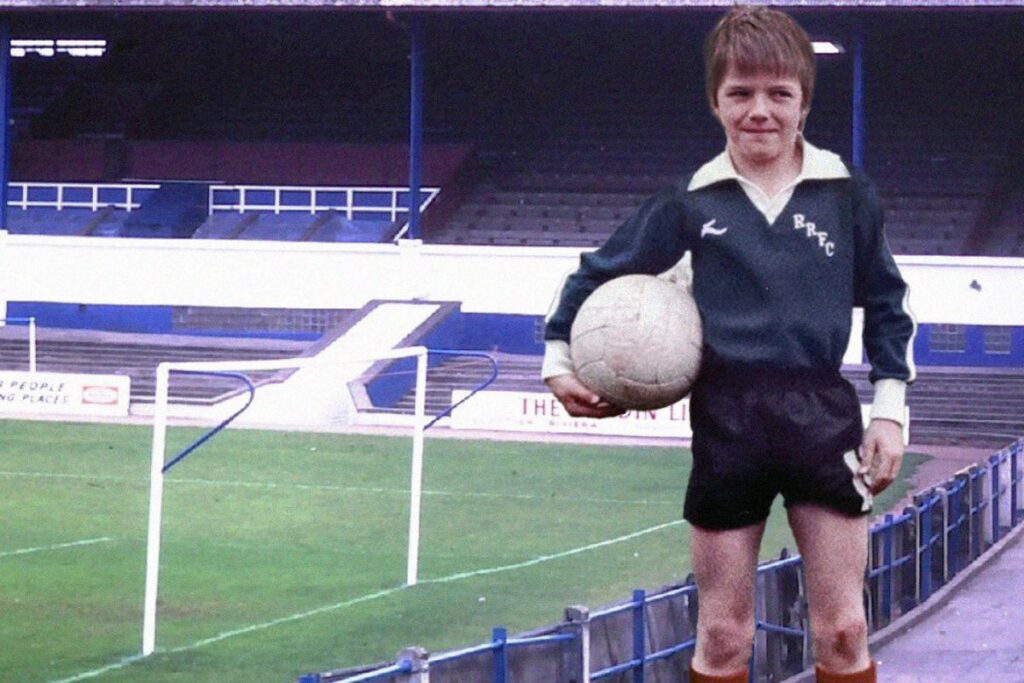
As a young boy with a passion for the game, he took his first steps on the pitch with this grassroots club, developing the fundamentals that would carry him forward.
Though exact dates aren’t well-documented, this was where his journey kicked off.
In 1987, at age 12, Beckham joined Tottenham Hotspur’s youth setup, a well-known London club with a strong academy.
From 1987 to 1991, he trained as a midfielder, impressing with his hard work and precision—qualities that later defined him.
During this period, from 1989 to 1991, Beckham was loaned out to Brimsdown Rovers, another local youth side.
This loan spell provided him with additional playing time and experience, allowing him to further develop his game in competitive matches.
The pivotal moment in Beckham’s youth career came in 1991 when he signed with Manchester United’s youth academy at the age of 16.
From 1991 to 1994, he became part of the famed “Class of ’92,” a group of talented youngsters under the guidance of Sir Alex Ferguson.
At United, Beckham’s technical skill, particularly his exceptional crossing and free-kick ability, began to shine.
His time in the youth ranks culminated in success with the FA Youth Cup victory in 1992, a triumph that signaled his readiness to step up to the senior level.
It was during these formative years at Manchester United that Beckham laid the groundwork for his illustrious professional career, transitioning from a promising talent to a household name.
David Beckham’s Youth Career
| Years | Team | Apps | (Goals) |
| — | Ridgeway Rovers | — | — |
| 1987–1991 | Tottenham Hotspur | — | — |
| 1989–1991 | → Brimsdown Rovers (loan) | — | — |
| 1991–1994 | Manchester United | — | — |
The Red Dawn: Manchester United Beginnings
David Beckham’s football odyssey began on July 8, 1991, when, at 16, he signed as a trainee with Manchester United.
A boy from Leytonstone with a dream, he joined a golden generation—Ryan Giggs, Gary Neville, Phil Neville, Nicky Butt, and Paul Scholes—under the watchful eye of coach Eric Harrison.
Together, they stormed to the FA Youth Cup in May 1992.
David Beckham scored in the first leg of the final against Crystal Palace, a 3–1 win, and played the full 90 minutes in the 3–2 second-leg victory, securing a 6–3 aggregate triumph. It was a glimpse of the magic to come.
His first-team debut arrived on September 23, 1992, as a substitute in a League Cup match against Brighton & Hove Albion.
A year later, on January 23, 1993, David Beckham turned professional, but his path wasn’t instant stardom.
He tasted defeat in the 1993 FA Youth Cup final against Leeds United and celebrated with United’s reserves when they clinched the league in 1994.
Then, on December 7, 1994, David Beckham announced himself in Europe, scoring in a 4–0 Champions League win over Galatasaray—his first goal for the senior side.
A Loan Spell and a Premier League Return
To sharpen his skills, David Beckham was loaned to Preston North End in the 1994–95 season.
Arriving with doubts—“I thought Manchester United didn’t want me anymore,” he later recalled—he scored twice in five games, including a stunning goal direct from a corner.
The experience toughened him, proving he could thrive under pressure.
Back at United, David Beckham made his Premier League debut on April 2, 1995, against Leeds United, though the season ended trophyless as United finished second and lost the FA Cup final.
The 1995–96 season was a turning point. With veterans like Paul Ince and Andrei Kanchelskis departing, Sir Alex Ferguson bet on youth—his “Fledglings.”
Critics scoffed when United stumbled, losing 3–1 to Aston Villa, but David Beckham and his peers silenced them.
He became the right-sided midfielder, scoring the decisive goal in an FA Cup semi-final against Chelsea and assisting Eric Cantona’s winner in the final.
David Beckham’s first Premier League title arrived alongside the FA Cup—a glorious double.
The Shot Heard ‘Round the World
The 1996–97 season thrust David Beckham into the spotlight. On August 17, 1996, against Wimbledon, he spotted goalkeeper Neil Sullivan off his line and unleashed a shot from the halfway line.
“It seemed to hang in the air forever,” he later said.
The ball sailed 57 yards into the net, erupting the crowd and making David Beckham a household name.
Voted No. 18 in Channel 4’s 100 Greatest Sporting Moments, it remains the Premier League’s finest opening-day goal.
Wearing the No. 10 shirt, he helped United retain the title and earned the PFA Young Player of the Year award.
By 1997–98, David Beckham inherited the iconic No. 7 shirt, once worn by George Best and Cantona.
His nine goals and league-leading 13 assists—including a free kick against rivals Liverpool—couldn’t stop Arsenal from pipping United to the title. But the best was yet to come.
The Treble: David Beckham’s Pinnacle
The 1998–99 season was David Beckham’s magnum opus. After a tumultuous World Cup, he returned to United determined to prove his worth.
The treble—Premier League, FA Cup, and Champions League—beckoned.
In the final league match against Tottenham, David Beckham’s curling equalizer from 12 yards sparked a 2–1 win, clinching the title.
In the FA Cup final, he assisted both goals in a 2–0 victory over Newcastle.
Then, in the Champions League final against Bayern Munich, with Scholes and Keane suspended, David Beckham played centrally.
Down 1–0 in injury time, his two corners led to United’s dramatic 2–1 comeback. Runner-up for European Footballer of the Year, David Beckham had reached football’s summit.
Tensions and Titles at United
The 1999–2000 season saw David Beckham help United dominate the Premier League by 18 points, scoring five goals in a late surge.
But cracks emerged in 2000–01 when Ferguson fined him for missing training—blaming Victoria’s influence—and dropped him for a key match.
Still, David Beckham’s nine goals and 12 assists secured a third straight title. In 2001–02, despite a metatarsal injury from a Champions League clash, he signed a lucrative contract extension, scoring a career-high 16 goals.
The 2002–03 season, however, was his United swansong.
After a boot-throwing spat with Ferguson left him with stitches above his eye, David Beckham scored 11 goals as United reclaimed the title.
With 265 Premier League appearances, 62 goals, and six titles, his Manchester chapter closed.
Real Madrid: David Beckham Joins the Galácticos
In July 2003, David Beckham swapped Manchester red for Real Madrid white, joining the Galácticos for €37 million.
Unveiled by Alfredo Di Stéfano, he took the No. 23 shirt, inspired by Michael Jordan.
Playing with Zidane, Ronaldo, and Figo, David Beckham scored on his La Liga debut and netted five times in his first 16 games.
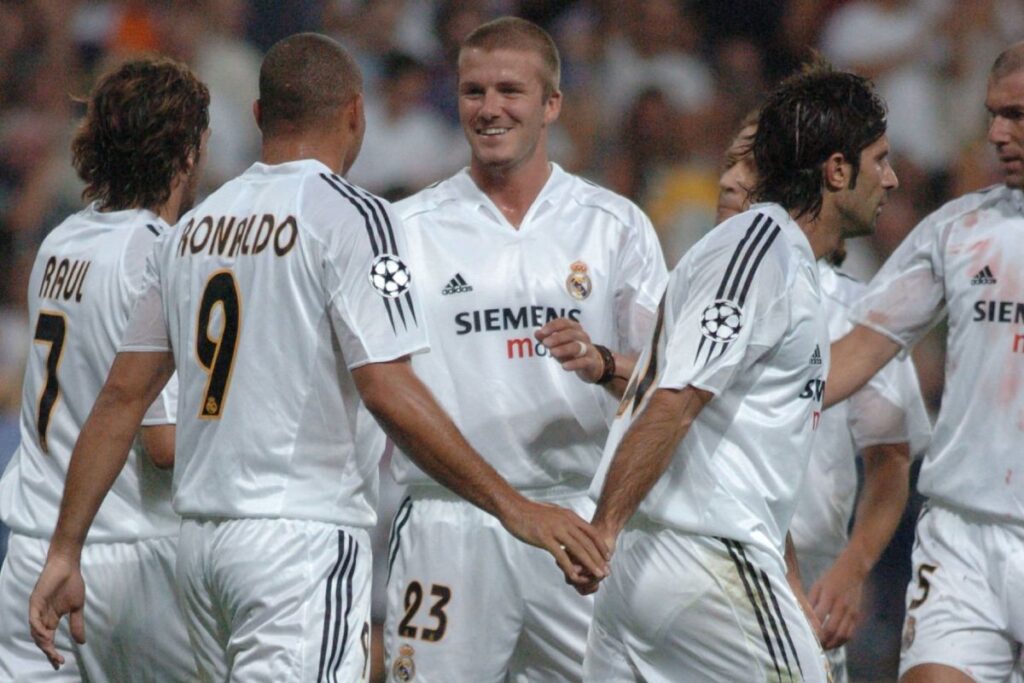
Despite a Spanish Super Cup win, the 2003–04 season disappointed, with Real finishing fourth. Off-field drama—a petrol-wielding intruder at his home—added tension, but David Beckham pressed on.
Managerial upheaval marked 2004–05, with three coaches in a year.
David Beckham’s deliberate foul admission against Wales stirred controversy, yet he ranked third in La Liga assists by 2005–06.
Real finished second to Barcelona both years, and Champions League exits stung.
In 2006–07, new coach Fabio Capello sidelined him, and David Beckham announced his LA Galaxy move.
But a late resurgence—scoring a vital free kick against Real Sociedad—saw him reinstated.
On June 17, 2007, he started in Real’s title-clinching 3–1 win over Mallorca, ending his Madrid tenure with a La Liga crown and $600 million in merchandise sales.
LA Galaxy: David Beckham’s American Revolution
David Beckham’s $32.5 million move to LA Galaxy in July 2007 was a seismic shift for MLS.
Unveiled to 5,000 fans, he aimed to elevate soccer in America.
His debut against Chelsea was muted by an ankle injury, but on August 15, 2007, David Beckham scored his first Galaxy goal—a free kick—in a SuperLiga semi-final.
A knee sprain sidelined him, and the Galaxy missed the playoffs.
In 2008, he scored from 70 yards against Kansas City, echoing his Wimbledon feat, but the team faltered again.
Milan Loans and Galaxy Redemption
To stay fit for England, David Beckham joined AC Milan on loan in January 2009. Wearing No. 32, he scored twice in four games, impressing coach Carlo Ancelotti.
A permanent move fell through, but he returned to the Galaxy mid-season, facing fan backlash—“Go home fraud” signs greeted him.
Undeterred, David Beckham led the Galaxy to the 2009 Western Conference title, though they lost the MLS Cup on penalties.
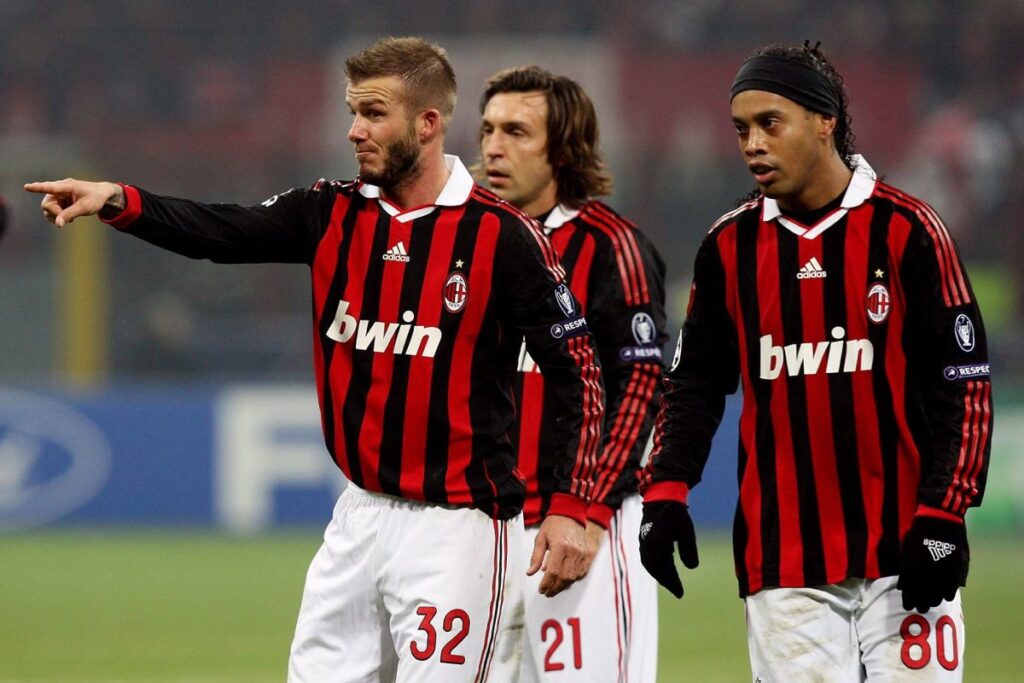
A second Milan loan in 2010 saw him face United at Old Trafford, earning applause, but an Achilles injury ended his World Cup hopes.
Back with the Galaxy in 2010, David Beckham scored a trademark free kick against Chivas USA, securing a Supporters’ Shield.
In 2011, he delivered nine assists and scored from a 30-yard free kick, captaining the Galaxy to their third MLS Cup—a 1–0 win over Houston.
In 2012, David Beckham added seven goals and nine assists, leading the Galaxy to a fourth-place finish and a second straight MLS Cup, defeating Houston 3–1.
His final Galaxy game, on December 1, 2012, earned a standing ovation.
Paris Saint-Germain: David Beckham’s Final Bow
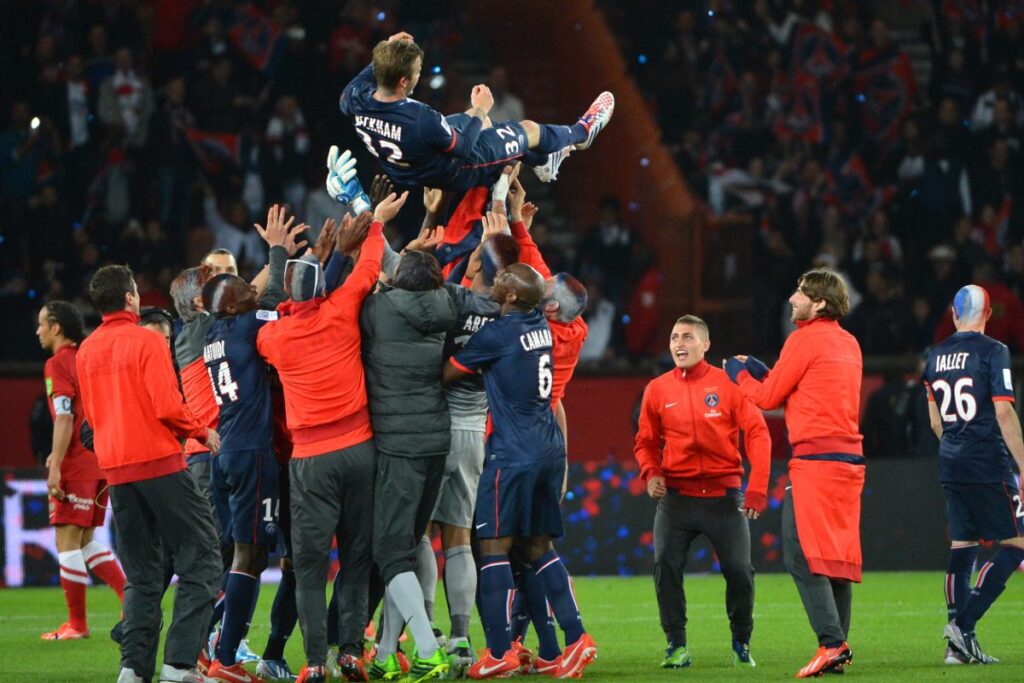
On January 31, 2013, David Beckham signed a five-month deal with PSG, donating his salary to charity.
Debuting against Marseille, he became PSG’s 400th player. On May 12, 2013, PSG clinched Ligue 1 with a 1–0 win over Lyon—David Beckham’s fourth league title in four countries.
Named captain for his last home game against Brest on May 18, he assisted a goal before exiting to hugs and applause in a 3–1 victory.
At 38, David Beckham retired, leaving football as a champion.
David Beckham’s International Career
David Beckham’s international career with England is a saga of soaring highs, crushing lows, and a redemption arc that could rival any Hollywood script.
From his early days with the youth teams to his senior debut in 1996 and his final cap in 2009, Beckham’s journey with the Three Lions began with his formative experiences at the international level.
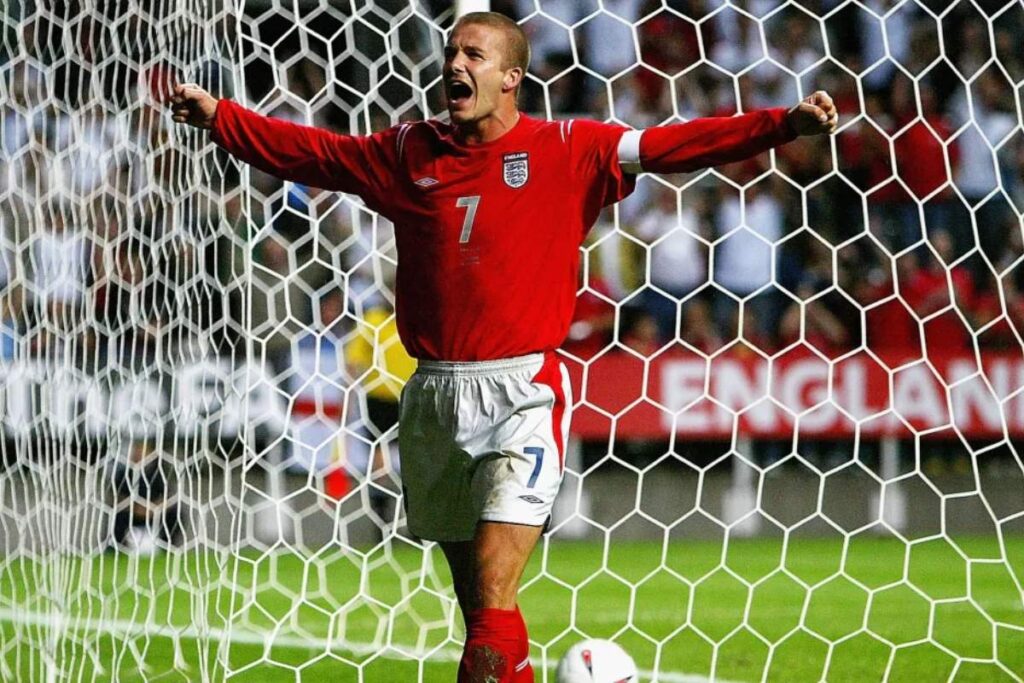
David Beckham’s early international career with England youth teams saw him represent the Under-18 and Under-21 sides, laying the foundation for a remarkable tenure.
He went on to don the senior England jersey 115 times, captaining the side in 59 of those matches—a tally that places him fourth among England’s most-capped players, behind legends like Bobby Moore and Peter Shilton.
His journey wasn’t just about statistics; it was about a footballer who became a national icon, weathering storms of criticism to emerge as a symbol of resilience and brilliance.
This is the story of David Beckham’s England career—a tale of free kicks, heartbreak, and an unbreakable spirit.
David Beckham With England Youth Teams
David Beckham’s international career with England began at the youth level, where he represented the country at both the Under-18 and Under-21 stages.
Between 1992 and 1993, Beckham featured for the England U18 team, making three appearances.
Despite his involvement, he did not find the back of the net, finishing with zero goals.
Later, from 1994 to 1996, he stepped up to the England U21 squad, where he played nine times.
Once again, he did not score any goals during these matches, ending his U21 tenure with a tally of zero.
These early experiences laid the groundwork for his eventual rise to prominence with the senior England national team.
David Beckham’s England Debut
David Beckham’s international odyssey with the England national team began on September 1, 1996, in a World Cup qualifier against Moldova.
At 21, the Manchester United starlet stepped onto the pitch in Chişinău, a fresh-faced talent with a mop of hair and a dream.
England won 3–0, and though David Beckham didn’t score, his presence hinted at the promise to come.
The following year, he joined England for the Tournoi de France, a friendly tournament warming up for the 1998 World Cup.
Playing alongside seasoned pros, David Beckham was finding his footing, his pinpoint passes already catching the eye.
David Beckham at the 1998 World Cup
The 1998 FIFA World Cup in France was David Beckham’s first major tournament—and it nearly broke him.
He played every qualifying match for England leading up to the 1998 FIFA World Cup and earned a spot on the 23-player roster for the tournament in France.
However, England’s manager, Glenn Hoddle, openly criticized him, claiming Beckham lacked focus on the competition.
As a result, he was left out of the starting lineup for England’s first two matches against Tunisia and Romania.
His chance came in the third game against Colombia, where David Beckham curled a 30-yard free kick into the net for his first England goal, sealing a 2–0 win.
The crowd roared; England had a new hero.
But glory turned to infamy in the last-16 clash with Argentina. Provoked by Diego Simeone’s rough challenge, David Beckham flicked a leg in retaliation—a petulant kick to the calf.
Simeone collapsed theatrically, and referee Kim Milton Nielsen flashed red.
England, down to ten men, drew 2–2 but lost on penalties. The nation turned on David Beckham.
Effigies swung outside pubs, newspapers printed dartboards with his face, and death threats followed. At 23, David Beckham was public enemy number one.
David Beckham and England at Euro 2000
The scars of ’98 lingered into Euro 2000. In a 3–2 loss to Portugal, David Beckham set up two goals, but fans taunted him relentlessly.
His response—a raised middle finger—shifted the narrative. Newspapers that once vilified him called for peace, and slowly, David Beckham began to rebuild his bond with England’s faithful.
Though the tournament ended in a group-stage exit, his resolve was hardening.
In the second match against Germany, David Beckham played the full 90 minutes, contributing to England’s victory sealed by a single goal.
The decisive moment came in the 53rd minute when Alan Shearer headed in the winner, capitalizing on the disruption caused by Beckham’s fierce, curling free kick that whipped into the German penalty area, evading defenders and finding the Newcastle striker unmarked at the far post.
Beckham also featured in England’s third group-stage game against Romania, which ended in a 3–2 defeat.
Despite the loss, England had a late opportunity to level the score with Romania.
Beckham delivered a powerful, stinging free kick, but Shearer narrowly failed to connect with a header, allowing the ball to drift harmlessly into the arms of the relieved Romanian goalkeeper, Bogdan Stelea.
In the end, England finished third in the group and failed to qualify for the next round of the competition.
Captain Beckham: A Hero Reborn
On November 15, 2000, after Kevin Keegan’s exit, caretaker manager Peter Taylor handed David Beckham the England captaincy—a role cemented by Sven-Göran Eriksson.
His finest hour came on October 6, 2001, in a World Cup qualifier against Greece. Trailing 2–1 with seconds ticking away, England needed a draw to qualify.
Teddy Sheringham won a free kick eight yards out, and David Beckham stepped up. His curling strike soared into the top corner, sparking pandemonium at Old Trafford.
“Give that man a knighthood!” the commentator cried. David Beckham had gone from villain to savior, securing England’s 2002 World Cup berth and earning BBC Sports Personality of the Year.
2002 World Cup: Revenge and Resilience
The 2002 World Cup in Japan and South Korea saw a partially fit David Beckham, nursing a metatarsal injury, lead England against Sweden in the opener.
He played through pain, but his moment of truth came against Argentina.
Four years after his red card, David Beckham faced his demons from the penalty spot.
His shot rifled past Pablo Cavallero, clinching a 1–0 win—a personal exorcism.
In the second round, he assisted in a 3–0 rout of Denmark, but Brazil ended England’s run in the quarters.
Critics pounced, blaming David Beckham for a mistimed tackle, yet his leadership shone through.
Euro 2004 and a Double Miss
At Euro 2004 in Portugal, David Beckham captained England with pride.
Against France, his penalty was saved by Fabien Barthez in a 2–1 loss.
In the quarter-final against Portugal, after a 2–2 draw, his shootout penalty skied over the bar—his second miss of the tournament.
England fell 6–5 on penalties, and David Beckham’s anguish was palpable.
Yet, his 50th captaincy appearance came later that year against Argentina, despite a red card against Austria making him the first England captain sent off.
2006 World Cup: David Beckham’s Last Stand
The 2006 World Cup was David Beckham’s swan song as captain. Against Paraguay, his free kick forced an own goal for a 1–0 win.
In the Trinidad and Tobago clash, his 83rd-minute cross set up Peter Crouch, and he assisted Steven Gerrard in a 2–0 victory, earning Man of the Match honors.
Against Ecuador, David Beckham’s 59th-minute free kick—a bending beauty—made him the first Englishman to score in three World Cups.
Dehydrated and ill, he vomited on the sidelines, a warrior spent. Portugal ousted England on penalties in the quarters, and a tearful David Beckham stepped down as captain after 58 games, passing the armband to John Terry.
The Wilderness and a Triumphant Return
New coach Steve McClaren dropped David Beckham in August 2006, favoring younger blood.
But on May 26, 2007, McClaren recalled him for a friendly against Brazil at the new Wembley.
David Beckham’s cross led to John Terry’s goal, and against Estonia, he assisted twice in a 3–0 win.
His move to LA Galaxy didn’t dim his England fire—he played against Germany as the first England star at a non-European club and earned his 99th cap against Croatia, assisting in a 3–2 loss that cost Euro 2008 qualification.
100 Caps and Beyond
On March 26, 2008, Fabio Capello restored David Beckham for a friendly against France, granting him his 100th cap—only the fifth Englishman to reach the milestone.
Against the USA, he assisted Terry again, and on June 1, 2008, he captained England against Trinidad and Tobago, a stunning turnaround from his 2006 exile.
By February 11, 2009, David Beckham matched Bobby Moore’s 108 outfield caps against Spain, and on March 28, he surpassed Moore with his 109th cap against Slovakia, assisting Wayne Rooney.
His final appearance came on October 14, 2009, in a 3–0 win over Belarus, his 115th cap.
The Final Chapter and Olympic Dreams
An Achilles injury in March 2010 dashed David Beckham’s 2010 World Cup hopes.
Capello, revamping the squad post-tournament, signaled a shift to youth, though he left the door ajar for one last Wembley farewell.
David Beckham vowed to stay available, but the call never came.
Named in the provisional 2012 Olympic squad, he was cut from the final selection, ending his competitive England dreams ten caps shy of Peter Shilton’s record.
David Beckham: A Career in Numbers
David Beckham’s football journey shines through the stats, a record of grit, goals, and glory across clubs and continents.
His career, packed with appearances and strikes, tells the story of a midfielder who left his mark.
Manchester United: The Launchpad
Beckham kicked off at Manchester United in 1992. His first season saw him play just one League Cup game, no goals yet.
By 1994–95, he stepped up, appearing 10 times and scoring once.
The next year, 1995–96, he exploded—40 games, 8 goals, including 33 in the Premier League.
He peaked in 2001–02 with 43 appearances and 16 goals, his best scoring season there.
Over 11 years, he totaled 394 games and 85 goals, mastering leagues, cups, and Europe’s biggest stages.
Preston North End: A Brief Loan
In 1994–95, Beckham loaned out to Preston North End in the Third Division.
He played 5 games and scored 2 goals, a short but sharp stint that honed his edge.
Real Madrid: Spanish Success
Joining Real Madrid in 2003, Beckham hit La Liga running. His first season brought 45 appearances and 7 goals.
He stayed steady, playing 155 games over four years and netting 20 goals, blending flair with consistency in Spain.
LA Galaxy: American Adventure
In 2007, Beckham crossed to LA Galaxy in Major League Soccer. He debuted with 7 games and 1 goal.
His strongest year came in 2012—31 games, 8 goals. Across six seasons, he tallied 118 appearances and 20 goals, lifting the MLS to new heights.
AC Milan: Italian Loans
Beckham twice loaned to AC Milan. In 2008–09, he played 20 games and scored 2.
In 2009–10, he added 13 more, no goals. His 33 total appearances brought Italian polish to his game.
Paris Saint-Germain: Final Chapter
In 2012–13, Beckham closed his career at Paris Saint-Germain. He played 14 games, didn’t score, but helped clinch Ligue 1.
His career grand total? 719 games, 129 goals—a legacy carved in every kick.
David Beckham’s Senior Career Statistics
| Years | Team | Apps | (Goals) |
| 1992–2003 | Manchester United | 265 | 62 |
| 1995 | → Preston North End (loan) | 5 | 2 |
| 2003–2007 | Real Madrid | 116 | 13 |
| 2007–2012 | LA Galaxy | 98 | 18 |
| 2009 | → AC Milan (loan) | 18 | 2 |
| 2010 | → AC Milan (loan) | 11 | 0 |
| 2013 | Paris Saint-Germain | 10 | 0 |
| Total | 523 | 97 |
David Beckham International Career in Number
David Beckham’s international career with England paints a picture of precision and passion.
Over 115 caps, he scored 17 goals, each one a chapter in his story of leadership and flair. His boots carved moments that echo through football history.
First Strike: A World Cup Debut
Beckham’s England tale began with a bang on June 26, 1998, at the 1998 FIFA World Cup.
In his 17th cap, he faced Colombia in Lens, France. His curling free kick soared past the wall, landing England a 2–0 win. It was his first taste of international glory.
Qualifiers and Redemption: The Early 2000s
The new millennium saw Beckham shine. On March 24, 2001, at Anfield, he netted against Finland in a tight 2–1 victory, his 39th cap.
Months later, on May 25, he struck again, helping crush Mexico 4–0 in a friendly.
He kept rolling, scoring twice against Greece in 2001—once in Athens for a 2–0 win, then a dramatic equalizer at Old Trafford for a 2–2 draw, securing World Cup qualification. That year ended with a friendly goal against Sweden, his 47th cap.
World Cup Heroics and Beyond
In 2002, Beckham faced Argentina at the World Cup in Sapporo, Japan. His penalty in the 51st cap clinched a 1–0 triumph—a sweet redemption after 1998.
He then powered England through Euro 2004 qualifiers, scoring against Slovakia, Macedonia (twice), Liechtenstein, and Turkey between 2002 and 2003.
Each goal pushed England closer to the tournament.
Later Years: Consistency and Class
Beckham’s magic continued. In 2004, he opened a 3–0 friendly win over Ukraine and a 2–0 qualifier against Wales.
In 2005, he struck against Azerbaijan, his 80th cap. His final international goal came on June 25, 2006, at the World Cup in Stuttgart.
A free kick downed Ecuador 1–0, his 93rd cap. Beckham’s 17 goals—spanning World Cups, qualifiers, and friendlies—cemented his legacy as England’s maestro.
David Beckham’s International Career Statistics
| Years | Team | Apps | (Goals) |
| 1992–1993 | England U18 | 3 | 0 |
| 1994–1996 | England U21 | 9 | 0 |
| 1996–2009 | England | 115 | 17 |
David Beckham’s Style of Play
David Beckham was one of the top players of his time, known worldwide and praised as one of the best free-kick takers ever.
By September 2023, he tied with Lionel Messi for fifth place in all-time direct free-kick goals, scoring 65.
Many experts also rank him among the greatest wide midfielders in football history.
Beckham mainly used his right foot. His passing range, vision, crossing skills, and ability to bend free kicks helped him set up teammates or score himself.
These strengths made him a standout right winger, even though he wasn’t very fast.
Unlike his Manchester United teammate Ryan Giggs, who took on defenders with the ball, Beckham relied on smart movement and accurate passes to get past opponents.
At Manchester United, he built a great partnership with right-back Gary Neville.
They worked well together because they understood each other. Neville often ran forward, overlapping with Beckham, and finished off his passes or crossed the ball when Beckham was closely guarded.
Though Beckham usually played on the right, he sometimes moved to central midfield, especially at Real Madrid and AC Milan.
Later in his career, as his speed slowed with age, he occasionally played deeper, creating plays from the back.
Beckham said he liked the center more, but he felt he performed best on the right.
Besides his passing and crossing, he was known for his energy and defensive effort.
In his younger days, he played as an attacking midfielder and a box-to-box midfielder.
At times, he even filled in as a wing-back.
Beckham also struck the ball well from long range and was a reliable penalty taker.
People admired his ball control, ability to find space, and his composure, determination, and football smarts.
His athleticism and hard work made him a complete player on the field.
Personal Life
David Beckham’s personal life has been as captivating as his football career.
Known for his high-profile marriage to Victoria Beckham, formerly “Posh Spice” of the Spice Girls, he has built a family life that often draws media attention.
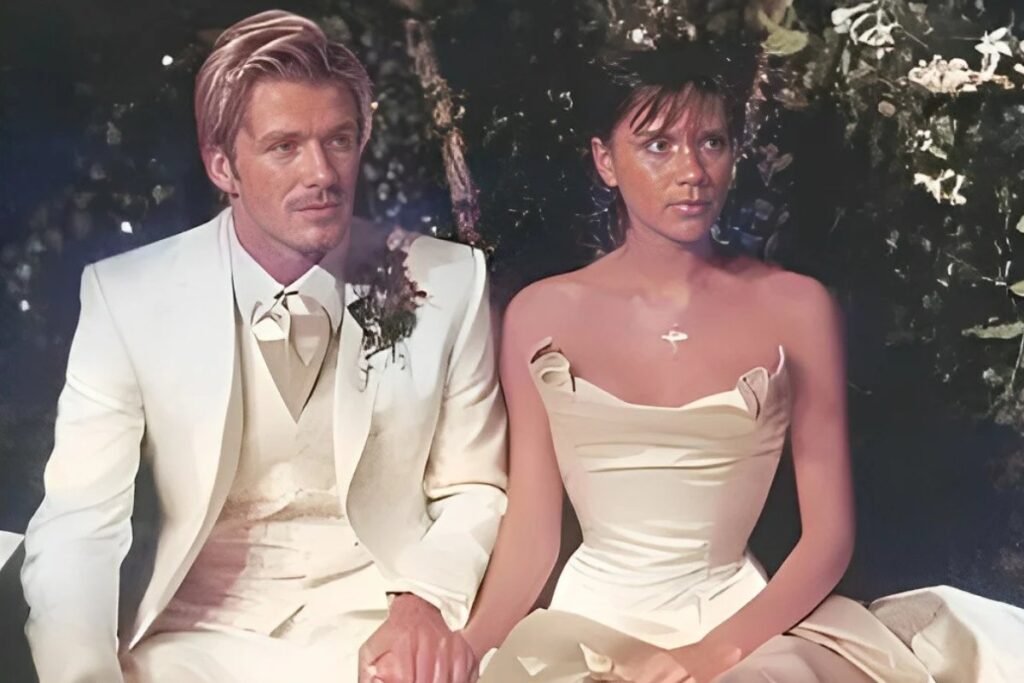
From their glamorous wedding in 1999 to raising four children, the Beckhams have remained a power couple in sports and entertainment.
Despite facing public scrutiny, including rumors and controversies, Beckham has maintained a strong family bond.
Away from the spotlight, he embraces a quieter lifestyle, tending to his farm in the Cotswolds while staying devoted to his passions, including football, fashion, and philanthropy.
Meeting Victoria and Early Romance
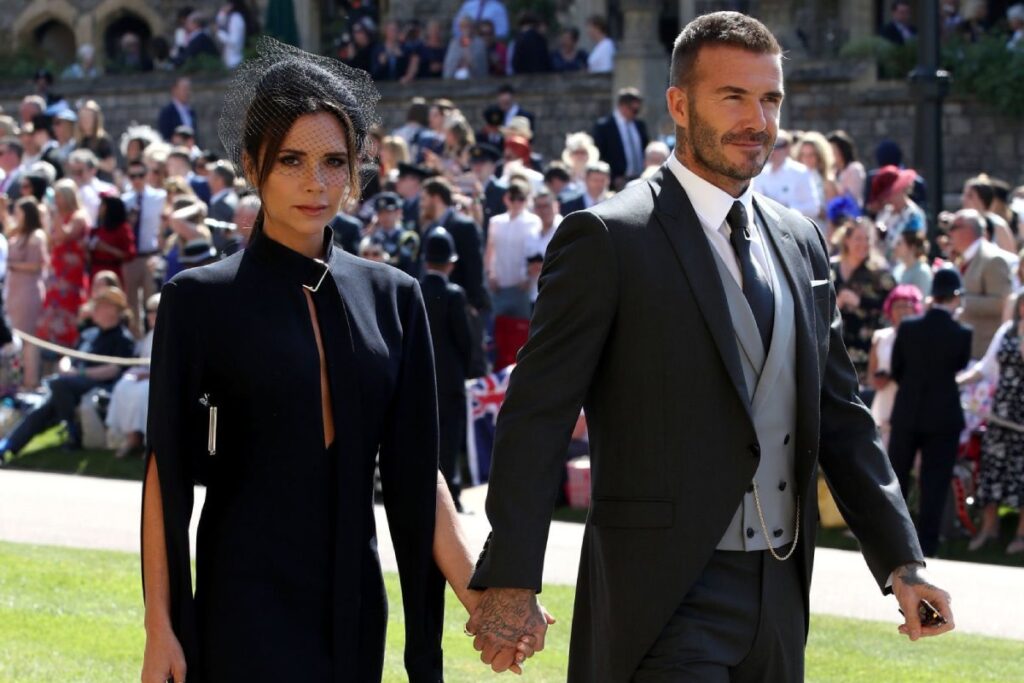
David Beckham’s personal journey began to take shape in 1997 when he met Victoria Adams at a Manchester United match.
She was “Posh Spice” from the Spice Girls, a wildly popular British band, while Beckham was shining on the football pitch.
Their romance sparked instant media frenzy, earning them the nickname “Posh and Becks.”
On January 24, 1998, Beckham proposed to her in a quiet restaurant in Cheshunt, England, marking the start of their shared life.
Lavish Wedding and Growing Family
The couple tied the knot on July 4, 1999, in a lavish ceremony at Luttrellstown Castle in Ireland.
Beckham’s teammate Gary Neville served as best man, and their four-month-old son, Brooklyn, carried the rings.
The Beckhams kept the event private with a deal through OK! Magazine, but photos of them on golden thrones slipped out.
The reception, staffed by 437 people, reportedly cost £500,000, reflecting their rising fame.
Together, David and Victoria raised four children: Brooklyn, born in London in 1999; Romeo, born in London in 2002; Cruz, born in Madrid in 2005; and Harper, born in Los Angeles in 2011.
Close friends like Elton John, David Furnish, and Elizabeth Hurley became godparents to Brooklyn and Romeo, while Cruz and Harper were baptized Catholic with Eva Longoria and Marc Anthony as godparents.
Parenting and Family Life
Beckham’s sons all trained at Arsenal’s academy, with Brooklyn playing for the U16 team until 2015.
Following their father’s flair, Brooklyn and Romeo ventured into modeling and earned spots on GQ’s best-dressed list.
Early in his career, Beckham bought a modest Worsley home in 1995 at age 20.
After marrying, he and Victoria purchased a sprawling Hertfordshire estate in 1999, dubbed “Beckingham Palace,” which they sold in 2014.
Personal Quirks and Public Persona
Victoria coined the nickname “Golden Balls” for Beckham on TV in 2008, celebrating his comeback after the 1998 World Cup.
Beckham lives with OCD, keeping everything orderly—Victoria once shared how their three fridges (one for food, one for salad, one for drinks) stay perfectly balanced, with odd items tossed out.
A devoted royalist, he waited 12 hours in 2022 to honor Queen Elizabeth II.
Scandals and Quieter Life
In 2004, rumors swirled when assistant Rebecca Loos and model Sarah Marbeck claimed affairs with Beckham. He called the accusations “ludicrous.”
A 2023 Netflix documentary, Beckham, revisited the Loos story, with Beckham reflecting on the strain it put on his marriage without confirming it.
Years later, in the 2023 Netflix documentary ‘Beckham,’ he revisited the Loos story.
He neither confirmed nor denied the allegations, stating only that those days tested his marriage.
The iconic football star reflected on the strain it put on his relationship without admitting anything.
Now, since 2020, David’s has embraced a quieter life and found peace tending bees and farming at their Cotswolds barn, a quiet spot they picked up in 2016.
And so, the story of David and his family rolls on, full of love, fame, and a little country charm.
Legal and Privacy Incidents
David Beckham’s journey wasn’t always smooth off the football pitch.
Legal battles and leaked secrets marked chapters of his life, revealing a man navigating fame’s tricky waters with grit and grace.
In September 2010, Beckham faced a storm when a magazine, In Touch, printed claims from a woman named Irma Nici. She said she’d slept with him.
Furious, Beckham took her and others to court in the US, demanding the story be struck down.
The case didn’t go his way—American free speech laws protected the magazine.
But later, the publication admitted the tale was false, clearing his name after the fight.
Years down the road, in 2019, Beckham hit another bump. On May 9, Bromley Magistrates Court banned him from driving for six months.
The trouble started on November 21, 2018, when someone snapped a photo of him holding a phone while stuck in slow traffic.
Beckham owned up to it, pleading guilty. The court added six points to his license, already carrying six from past speeding tickets.
They fined him £750, plus £100 for prosecution costs and a £75 surcharge. For a man used to speeding down the wing, it was a humbling pause.
Then came 2015, when hackers broke into a Portuguese company tied to Beckham’s spokesman.
Private emails spilled out, and papers like Germany’s Der Spiegel and France’s L’Equipe pounced.
The leaks showed Beckham fuming in 2013 over missing out on a knighthood.
The Honours Committee, nudged by the UK’s tax office, HMRC, had worried about his taxes.
His team fought back, saying some emails were faked, though they admitted others were real.
The headlines stung, but Beckham stood firm, his legacy weathering yet another test.
The Tattoos of David Beckham: A Life’s Canvas
David Beckham’s skin tells a story, etched in ink across his body. By 2021, he boasts over 65 tattoos, decorating his hands, neck, and even his head.
Each mark carries meaning, a permanent tribute to the people and beliefs that shape him.
His family takes center stage in his tattoo collection. The names of his sons—Romeo, Cruz, and Brooklyn—stand out boldly.
His wife, Victoria, claims a special spot too. On his left forearm, her name appears in Devanagari script, the writing of Hindi and Sanskrit.
Beckham chose this style to avoid an English version he thought might look “tacky.” A small hiccup, though—the tattoo spells “Vhictoria” by mistake.
He got his first ink in 1999, inspired by his newborn son Brooklyn. In his book David Beckham: My Side, he recalls chatting about tattoos with Mel B and her then-husband Jimmy Gulzar.
“When you see me, you see the tattoos,” he wrote. “They show how I feel about Victoria and the boys. They’re part of me.”
Beckham honors his daughter, Harper, with several tattoos too. Some designs carry a spiritual touch, reflecting his faith.
In 2018, he added a solar system to the left side of his scalp, a striking piece that joins his growing gallery.
Manchester tattoo artist Louis Molloy crafted many of these works, turning Beckham’s body into a living masterpiece.
From family names to cosmic art, Beckham’s tattoos map his journey. They shout love, mark milestones, and blend style with soul.
What started as a father’s impulse after Brooklyn’s birth grew into a bold statement—ink that speaks louder than words, forever part of the man who wears it.
David Beckham’s Global Influence Beyond Football
David Beckham’s fame extended far beyond the football pitch. His marriage to Victoria Beckham, a global pop star from the Spice Girls, transformed him into a household name beyond sports.
Together, they became one of the most recognizable power couples, influencing fashion, entertainment, and business.
A Fashion and Style Icon
Beckham’s influence in fashion emerged early in his career.
In 1997, he signed a £4 million endorsement deal with British hair brand Brylcreem, marking his entry into the world of commercial partnerships.
Over the years, his hairstyles—from buzz cuts to mohawks—became global trends, reinforcing his status as a style icon.
In 2002, media outlets labeled him the ultimate “metrosexual,” a title he embraced.
Embracing a Diverse Fanbase
Despite being heterosexual, Beckham built a strong connection with the LGBTQ+ community.
He supported gay media and gave interviews to publications catering to LGBTQ+ audiences.
His open support earned him the title of “gay icon,” which he accepted with pride.
However, his partnership with Qatar as a brand ambassador for the 2022 FIFA World Cup sparked controversy due to the country’s laws against LGBTQ+ rights.
Beckham defended his role, claiming the event would promote inclusivity.
The Business of Beckham
Beckham’s commercial success reached new heights in the 2000s.
His business ventures expanded into esports in 2020 when he became a minority owner of Guild Esports.
David Beckham launched his eyewear (David Beckham Eyeware) collection in 2020 in collaboration with Safilo.
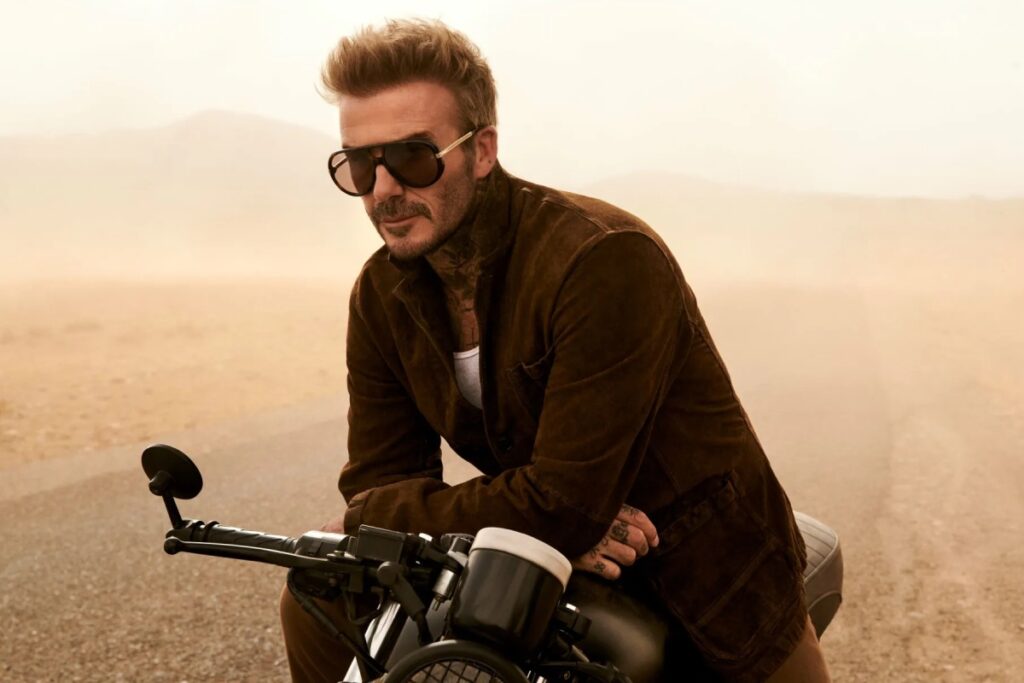
The brand is known for its timeless designs, seamlessly blending vintage aesthetics with contemporary craftsmanship.
Reflecting Beckham’s signature elegance, the collection features a mix of classic silhouettes and modern elements.
With a focus on enduring style and a spirit of adventure, it captures sophistication with a fresh, contemporary edge.
In 2021, he acquired a 10% stake in electric vehicle company Lunaz.
In 2007, he and Victoria launched a fragrance line in the U.S., earning $13.7 million.
Endorsement Empire
Beckham became one of the most marketable athletes of all time. His face graced the covers of top magazines, including Details and W.
In 2003, he signed a $160 million lifetime contract with Adidas, securing a share of profits from all Beckham-branded products.
His 2004 Adidas commercial with rugby star Jonny Wilkinson was named one of Britain’s best ads of the year.
He also held long-term endorsement deals with PepsiCo and The Walt Disney Company.
In 2021, he became a global ambassador for Maserati, launching a personalized collection with the luxury brand in 2023.
Beyond endorsements, Beckham became the face of video games.
Titles like David Beckham Soccer and Go! Go! Beckham! introduced him to gaming audiences, while FIFA 98 featured him on its UK cover.
In 2020, he signed a deal with EA Sports for FIFA 21, further cementing his gaming legacy. His partnership with EA Sports earned him a £40 million deal.
A Cultural and Sporting Ambassador
Beckham used his influence to promote global events. He played a crucial role in bringing the 2012 Olympics to London, traveling with the British delegation to Singapore in 2005.
During the 2008 Beijing Olympics closing ceremony, he famously kicked a football from a London double-decker bus into the stadium.
At the 2012 London Games, he carried the Olympic flame by speedboat.
China appointed Beckham as its global football ambassador in 2013, aiming to rebuild the sport’s reputation after corruption scandals.
The same year, he partnered with Sky Sports to promote their coverage.
His television appearances continued with guest spots on Late Night with Jimmy Fallon and the BBC’s Sport Relief special of Only Fools and Horses.
Influence Beyond Sports
Beckham’s social media presence remains massive. At the peak of his career, “David Beckham” became one of the most searched sports topics on Google in 2003 and 2004.
By 2015, he ranked third among the world’s most-followed athletes, behind Cristiano Ronaldo and Lionel Messi.
Today, he has over 80 million Instagram followers, making him one of the UK’s most-followed personalities.
In 2016, Beckham took a political stand, voicing his opposition to Brexit.
Two years later, he became the British Fashion Council’s Ambassadorial President.
Before the 2026 World Cup vote, he endorsed North America’s bid to host the tournament.
When Beckham moved to Los Angeles in 2007 to join LA Galaxy, the media frenzy escalated. Hundreds of paparazzi flooded LAX upon his arrival.
A star-studded welcome party featured Hollywood elites like Steven Spielberg, Tom Cruise, Oprah Winfrey, and Will Smith.
Victoria even appeared on The Tonight Show with Jay Leno to discuss their move.
Most recently, in May 2024, Beckham used his platform to call for an immediate ceasefire during Israel’s Rafah offensive in Gaza.
The Philanthropic Work of David Beckham
David Beckham’s story stretches far beyond the football field, glowing with a passion for helping others.
His philanthropy threads through his worldwide fame, revealing a man who turns his spotlight into support for those who need it most.
In 2005, Beckham stepped up as a UNICEF Goodwill Ambassador, a role that grew from his early days supporting the group at Manchester United.
He made it personal in 2015, launching the 7 Fund with UNICEF to celebrate a decade of service.
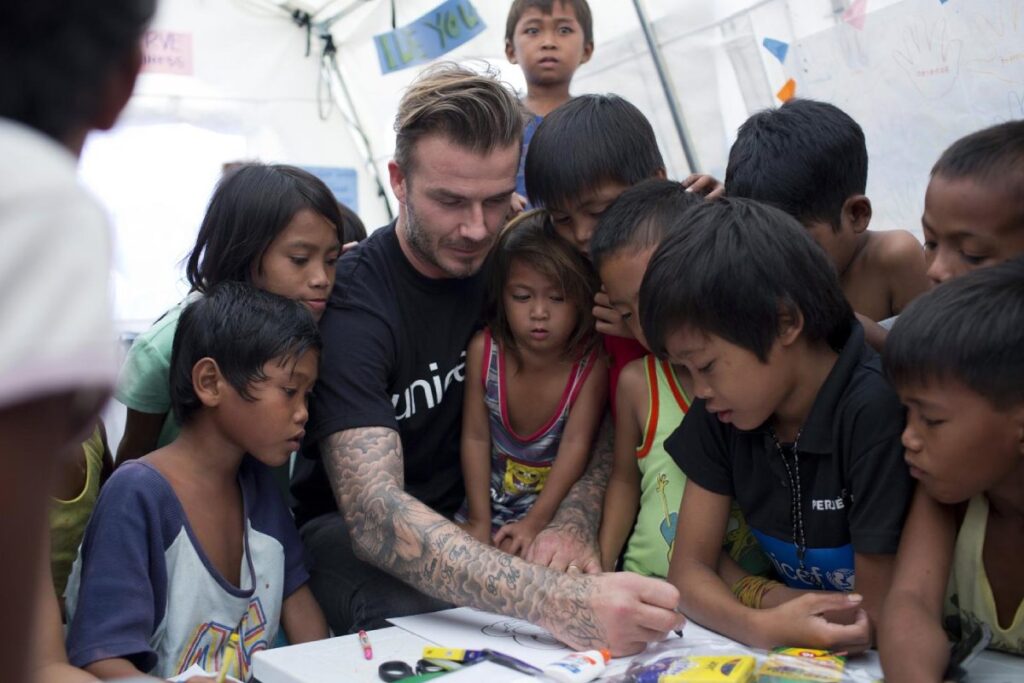
This special project focuses on vulnerable kids—especially girls—tackling problems like violence, bullying, child marriage, and missing school.
Beckham journeys across the globe, from Sierra Leone to Indonesia, meeting children and shining a light on struggles like hunger and HIV/AIDS. He shows how small things—vaccines, mosquito nets—make big differences.
Beckham doesn’t stop there. He co-founded Malaria No More UK to fight a deadly disease.
He supports Help for Heroes, helping wounded soldiers, and runs the Victoria and David Beckham Charitable Trust, delivering wheelchairs to kids.
In 2013, while playing for Paris Saint-Germain, he gave his whole salary to a children’s charity, saying it felt right.
His family pitches in too—Victoria and their kids, like Romeo who ran a marathon for UNAIDS, carry the torch of kindness.
In 2017, leaked emails hinted he wanted a knighthood, stirring doubts about his heart.
Beckham and UNICEF hit back, highlighting the millions he’s raised and given.
He stays steady—launching emergency funds, speaking at the UN, always putting kids first.
Now, in 2025, marking 20 years with UNICEF, Beckham’s giving spirit stands tall.
His legacy proves he’s not just a football legend—he’s a man who changes lives with every step he takes.
David Beckham: Stepping onto the Silver Screen
David Beckham’s fame stretched beyond the football field and into the world of movies, where his name and face popped up in unexpected places.
In the 2003 romantic comedy Love Actually, Hugh Grant’s character proudly listed Beckham’s right and left feet among Britain’s greatest treasures, alongside Shakespeare and the Beatles.
It was a nod to his legendary status, even if Beckham didn’t step in front of the camera himself.
Beckham didn’t appear in person in the 2002 film Bend It Like Beckham, a story about a girl chasing football dreams.
He and Victoria hoped to cameo, but their busy lives got in the way.
Instead, the director brought in lookalike Andy Harmer to fill in, while old clips of Beckham played on screen.
In 2005, he teamed up with stars Zinedine Zidane and Raúl for a cameo in Goal!, a football flick.
Harmer doubled for him again in a party scene. Beckham took a bigger role in the sequel, Goal II: Living the Dream, showing up as himself when the main character joined Real Madrid.
Real teammates joined too, blending fact with fiction. In Goal III: Taking on the World, released straight to DVD in 2009, he appeared through World Cup footage from 2006.
Critics at Marketing Week in 2013 gently poked at his “limited acting skills,” but Beckham kept going.
His pal Guy Ritchie cast him in two films: as a projectionist in The Man from U.N.C.L.E. and as Trigger in King Arthur: Legend of the Sword.
In a quieter moment, artist Sam Taylor-Johnson filmed him sleeping in a Madrid hotel in 2004 after a training session.
That piece, made for London’s National Portrait Gallery, showed a softer side of the football icon.
Beckham’s film roles, big or small, proved his star power reached far beyond the pitch.
David Beckham’s Honor: A Legacy of Triumphs
David Beckham’s football career was defined by success, skill, and an unwavering commitment to excellence.
From his early days at Manchester United to his final season at Paris Saint-Germain, he collected an impressive array of titles and individual awards, cementing his place among football’s greatest legends.
Manchester United: A Golden Era
Beckham’s rise to stardom began at Manchester United, where he played a crucial role in one of the club’s most dominant eras.
He helped United win six Premier League titles, starting with the 1995–96 season and ending with the 2002–03 campaign.
His contributions were vital in securing two FA Cups and two FA Charity Shields, but his most memorable achievement came in 1999.
That year, he was instrumental in United’s historic treble-winning season, lifting the UEFA Champions League, the Premier League, and the FA Cup.
His precise corner kicks in the Champions League final helped United stage a dramatic comeback against Bayern Munich, sealing his legacy.
Real Madrid: Spanish Glory
In 2003, Beckham took on a new challenge, joining Real Madrid as part of the club’s famous “Galácticos” era.
While the competition was fierce, he proved his worth, helping Madrid win La Liga in the 2006–07 season and the Supercopa de España in 2003. His pinpoint passing and set-piece mastery made him a fan favorite in Spain.
LA Galaxy: Expanding Football’s Reach
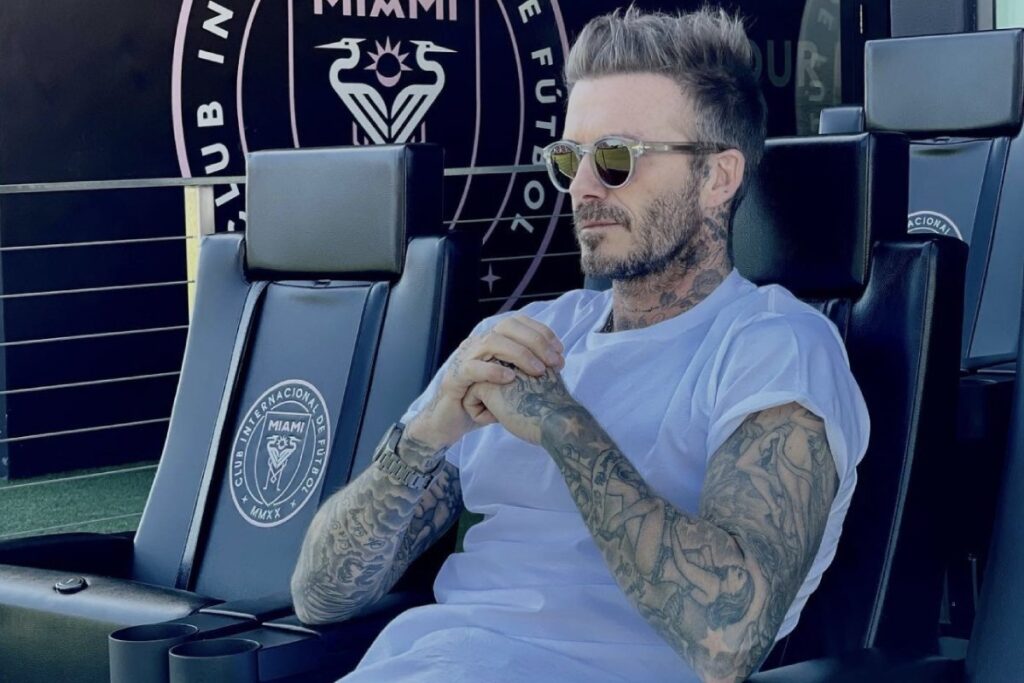
Beckham’s move to LA Galaxy in 2007 revolutionized Major League Soccer (MLS), attracting global attention to the league.
He won back-to-back MLS Cup titles in 2011 and 2012, along with multiple Supporters’ Shields and Western Conference titles.
His influence helped raise the profile of American football, paving the way for more international stars to join MLS.
Beckham’s contributions to football and pop culture were honored in 2019 when LA Galaxy unveiled a statue of him outside their stadium—the first of its kind in Major League Soccer.
Paris Saint-Germain: A Final Victory
In 2013, Beckham signed with Paris Saint-Germain (PSG), making history as the first English player to win league titles in four different countries—England, Spain, the United States, and France.
Although his time at PSG was brief, he played a role in securing the Ligue 1 title in the 2012–13 season before retiring from professional football.
Honors Beyond the Club Level
Beckham’s talent shone on the international stage as well.
With 115 caps for England, he was a key player in three FIFA World Cups.
He captained England for six years and helped the national team win the 1997 Tournoi de France, a prestigious four-team tournament.
Individual Achievements and Recognition
Beckham’s personal accolades reflect his influence on the game.
He finished as runner-up for the Ballon d’Or in 1999 and twice earned FIFA World Player of the Year silver awards in 1999 and 2001.
His name appeared in the UEFA Team of the Year (2001, 2003), and he was named England Player of the Year in 2003.
The Premier League recognized his brilliance by awarding him the Goal of the Decade for his iconic halfway-line strike against Wimbledon in 1996.
His impact extended beyond the pitch. In 2003, Queen Elizabeth II honored him with the title of Officer of the Order of the British Empire (OBE) for his services to football.
He was also named a UNICEF Goodwill Ambassador in 2005, dedicating himself to global humanitarian efforts.
Final Note
What sets David Beckham apart? It’s not just the trophies—though 19, including a Champions League title, speak volumes. It’s his ability to evolve.
From the boy who scored from halfway to the man who built a football empire, David Beckham redefined what it means to be a sports icon.
His free kicks, bending with precision, became legendary; Bend It Like Beckham (2002) immortalized his skill in pop culture.
David Beckham bridged football and fame, proving that an athlete could be a global ambassador.
His move to MLS sparked soccer’s growth in America, while his work with UNICEF highlights his humanity.
For fans, David Beckham is a reminder of football’s golden age; for aspiring players, he proves that hard work and vision can conquer all.
David Beckham’s life is a tapestry of triumphs, trials, and transformation.
From Leytonstone to Los Angeles, he turned talent into transcendence, leaving an indelible mark on football and beyond.
His 115 England caps, his treble with United, his titles across continents—all testify to a career of excellence.
Yet, it’s David Beckham the man—father, philanthropist, and icon—that endures.
As Inter Miami rises and his influence persists, David Beckham’s legacy is a living testament to the power of dreams, discipline, and a perfectly curled free kick.
At Facts and Tips, we strive for accuracy and honesty.
If you notice any errors, whether factual, editorial, or outdated information, please don't hesitate to contact us.
Found this Story about David Beckham informative and useful? Share it with your friends and colleagues—they might find it helpful too!


